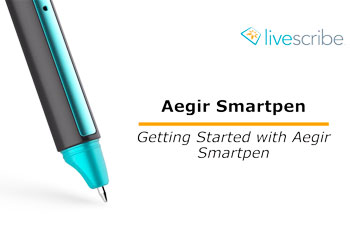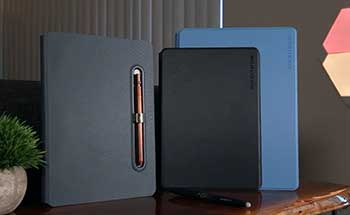Smartpens have revolutionized note taking by digitizing handwritten notes so they can be easily accessed and shared. Two of the most popular smartpens are Livescribe and Rocketbook.
While both pens sync notes to the cloud, they have some key differences that may make one better suited for your needs.
A Brief Comparison Table
| Feature | Livescribe | Rocketbook |
| Technology | Infrared camera tracks writing | Any pen ink erased with damp cloth |
| Compatible Paper | Livescribe dot paper notebooks | Any paper except glossy photo |
| Cloud Sync | Google Drive, OneDrive, Evernote | Google Drive, Dropbox, Evernote, more |
| Handwriting Search | Yes | No |
| Audio Recording | Yes | No |
| Reusable Pages | No | Yes |
| Price | $130-$200 for pen | $32 for pen, $12-25 for notebook |
Overview of Livescribe

Livescribe smartpens record handwritten notes and audio simultaneously. The key features include:
- Infrared camera in pen tip tracks writing on specially dotted paper
- Sync notes to Google Drive, OneDrive, Evernote
- Replay audio synced to your notes
- Search handwriting using Livescribe+ app
- Variety of pen styles and notebooks available
- Average price $130-$200
Livescribe pens provide a seamless way to digitize notes while also recording audio. The infrared tracking system converts writing into a digital format that is extremely accurate. Livescribe notebooks provide the special dotted paper the pen requires.
An important advantage of Livescribe is the ability to search handwritten notes using the Livescribe+ app. Overall, Livescribe offers a fully integrated smartpen and notebook solution.
Overview of Rocketbook
Rocketbook smartpens allow any pen ink to be erased using a damp cloth, enabling reusable notebooks. The key features include:
- Write using any pen, erase with damp cloth
- Sync notes to cloud services like Google Drive
- Variety of notebook sizes and styles
- Use app to organize and search notes
- Eco-friendly reusable pages
- Low cost pen and notebooks
Rocketbook provides a flexible system that works with any pen and paper. Rather than specialized dot paper, Rocketbook notebooks have a smooth surface that feels like traditional paper. The ink is completely erased with water, allowing each page to be reused endlessly.
While the Rocketbook system does not include audio recording and advanced handwriting search, it provides core smartpen functionality at a fraction of the cost of Livescribe. Overall, Rocketbook is ideal for budget-focused users that want reusable notebooks.
Also Read: Comparison Livescribe Symphony and Echo
Key Differences Between Livescribe and Rocketbook
Let’s take a deeper look at how Livescribe and Rocketbook smartpens stack up across several categories:
· Writing Experience

Livescribe pens can only be used with specially dotted paper, providing a slight friction feedback as you write. The ink appears bright and clear. Rocketbook pages have a smooth writing surface that feels closer to normal paper, with no textured feedback.
Ink appears slightly lighter but is still readable. Overall, both pens provide a positive writing experience. Livescribe offers a more high-tech feel while Rocketbook seems more like traditional pen and paper.
· Handwriting Digitization Accuracy
The infrared camera tracking system used by Livescribe results in extremely accurate handwriting digitization. Every stroke is precisely captured.
With Rocketbook, the image quality depends more on the pen and paper used. If you write small and smear at all, some words can be hard to decipher. Livescribe is the clear winner for digitizing messy handwriting accurately.
· Audio Recording and Playback
Livescribe smartpens include a built-in microphone and speaker that syncs audio recording with notes. You simply tap part of your written notes to hear the audio from that exact moment.
Rocketbook does not support any audio features. For students or journalists who want to record lectures or interviews while taking notes, Livescribe is the obvious choice.
· Searchability of Notes
The Livescribe+ app lets you search the entire text of your handwritten notes. Every word you write is indexed and accessible.
Rocketbook does not currently support search of handwritten text. You can only search titles of notes, not the content itself. If you want to be able to search back through extensive handwritten notes, Livescribe is superior.
Also Watch This Review Video:
· Reusability of Paper
A key advantage of Rocketbook is the ability to completely erase ink and reuse each page many times. This reduces waste and cost over time.
Livescribe requires purchase of special dot paper notebooks. The paper cannot be effectively erased and reused. If low long-term cost and sustainability are priorities, Rocketbook’s reusable paper is a major plus.
· Cloud Sync and Organization
Both Livescribe and Rocketbook integrate with popular cloud services like Google Drive, OneDrive, and Evernote to sync notes.
The Rocketbook app provides additional options like Dropbox and Box. Both pens allow you to digitally organize notes in folders by topic. Overall, cloud sync is robust in both ecosystems, with Rocketbook integrating with a few additional services.
· Cost Comparison
Livescribe pens range from $130 to $200 depending on model, with notebooks costing $20 or more. Rocketbook pens cost just $32 with notebooks priced at $12-25.
Reusable Rocketbook notebooks can be used for years with virtually no ongoing paper cost. If budget-friendly pricing is important, Rocketbook provides smartpen functionality at a fraction of the cost of Livescribe.
· Platform Availability
The Livescribe system is currently only available for iOS, with no Android app. Rocketbook has full apps for both iOS and Android. For Android users, Rocketbook is the only option currently. Even iPhone owners may prefer Rocketbook’s cross-platform flexibility.
Also Read: Comparison Between Wipebooks And Rocketbooks.
Frequently Asked Questions (FAQs)
Many consider the Livescribe 3 Smartpen to be the smartest pen currently available. It combines an infrared camera, microphone, speaker, and WiFi chip into a sleek pen device. The accompanying Livescribe+ app provides robust features like converting handwriting into digital text, indexing notes for search, and syncing audio recordings with notes. Overall, Livescribe 3 represents the cutting edge of smartpen technology.
Digital pens that use infrared camera tracking like Livescribe generally deliver the highest accuracy for converting handwriting into digital notes. IR tracking captures every stroke and movement precisely. Pens relying only on scanning paper are more prone to errors in digitization. While scanning technology is improving, infrared tracking remains the gold standard for digitizing messy handwriting flawlessly.
For large format writing, the MimioStudio smartboard stylus is arguably the best option. It integrates directly with Mimio whiteboards to provide the most responsive and accurate writing experience. Features include pressure sensitivity, customizable shortcuts, and automatic handwriting conversion to text. For high-end smartboard use, the MimioStudio stylus cannot be beat.
Unfortunately Livescribe pens require the use of specially dotted paper with tiny infrared dots. This special paper allows the camera in the pen to accurately track writing. Livescribe will not work properly on plain paper, notebooks, or other surfaces lacking the infrared dot pattern. Some users apply Livescribe dot stickers to customize other notebooks, but overall the pens are designed for Livescribe branded paper.
Also Read: Comparison Between remarkable 2 and Rocketbook
Final Thoughts
Both Livescribe and Rocketbook provide excellent smartpen experiences, with strengths in different areas. Livescribe is best for capturing extensive notes and lectures accurately thanks to the infrared tracking system.
But the pens and paper are expensive. Rocketbook is ideal if you want a budget-friendly reusable notebook with core digitizing features.
It comes down to priorities – Livescribe for maximum handwriting capture fidelity or Rocketbook for affordability and reusability. Either way, smartpens can massively boost your productivity and organization compared to traditional paper notes.
